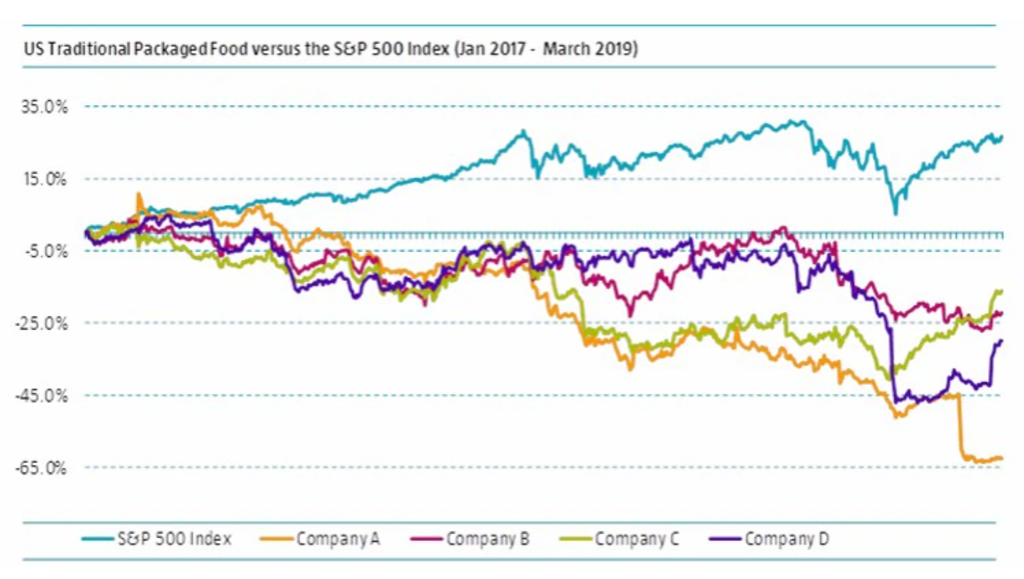
The key consumer trend of 2019: health and wellness
There is no denying that young consumers care about their health. This is reflected in a variety of choices – about diet, sports, wellness and leisure, work, travel and even clothing.
まとめ
- Millennials and Gen Z care about having a healthy lifestyle, and are willing to pay a premium for it
- This is disrupting the traditional food industry, which tends to favor cost efficiency over quality
- Drivers of the trend are the rise of local brands, social networks and e-commerce
Millennials and Gen Z use fitness trackers and smart watches to track training data and health information. They are willing to spend more money on interesting sporting goods and athleisure brands, such as the running and cycling app Strava, Allbirds shoes, which are made from natural materials, or an Apple smartwatch, just to name a few. And they eat more natural and organic foods with healthier ingredients and fresh herbs and spices.
“For millennials, wellness is an ongoing commitment,” says Robeco portfolio manager Jack Neele. Particularly noteworthy is Gen Z’s attitude to consumption, which has become more like an expression of individual identity, and a matter of ethical concern.
The healthy consumer space is truly diverse with subthemes ranging from fitness to food ingredients. It also includes corporate wellness, beauty, sleep, personalized care, athletic apparel, personalized nutrition, travel and hospitality, and mental wellness.
Within this vast universe, the industry of healthy and organic food is growing the fastest. For example, low-calorie sweeteners and vegetable snacking are becoming increasingly popular. And the demand for plant-based protein, as can be found in meatless sushi and vegan takeaway meals, continues to gain momentum. Many large traditional packaged food companies invest in this space, such as General Mills (Beyond Meat), Nestle (Impossible Foods), and Unilever (De Vegetarische Slager).

The organic food industry has multiple drivers
The industry has a few underlying drivers, the most important one being the strong growth of small and local brands, particularly in emerging markets. The health and wellness trend also reinforces it as it drives the need for more high-quality ingredients. The rising demand for convenience is another contributing factor, whether it be for on-the-go meals or shorter average meal preparation time.
The healthy consumer trend as a whole is also driven by the internet, which has lowered the barriers to entering the market. This has happened in all areas of the business – manufacturing, branding and distribution.
The trend has also received a boost from startup proliferation, which has made possible new and innovative ways of producing food. The era of social media also has also given it a push, as platforms like Instagram & Snapchat have made it possible to target specific audiences with advertising. And finally, with the help of e-commerce and logistics, any firm can now deliver its products to the customer’s doorstep.
Any firm now can deliver its products to the customer’s doorstep
These days, young consumers eat healthy and rely on the internet to find the healthiest foods. As a result, the producers of traditional packaged and processed food are finding they have to reinvent themselves, as merchants offering fresh and organic foods, meal delivery services and online grocery business models do a better job catering to millennials’ demands.
Moreover, the advancement of internet and e-commerce have lowered barriers to market entry for startups in this area. “It has never been easier to launch a brand and advertise it on networks like Instagram,” says Neele. All these factors have disrupted traditional food producers. “For years, they have been focused on efficient manufacturing and lowering prices often at the expense of quality and health characteristics,” says Neele.
Yet, consumers are now much better educated and are choosing different brands and products. So it comes as no surprise that the returns of most of the US-based traditional packaged food producers have been falling compared to the S&P 500 Index since at least 2017. Many of these companies are aiming to pivot their portfolios through acquisitions.

Source: Robeco Trends Investing
What are the implications for investors?
Investors can benefit greatly from having an understanding of the healthy consumer universe. The structural winners in this trend could either be new entrants which are able to benefit from it, or traditional food producers with a well-rounded product portfolio. This trend was one of the key themes covered at a media roundtable on Trends Investing organized by Robeco in Amsterdam last month.
“We believe that within the space, the specialty ingredients market is seeing significant growth and presents an important investment opportunity,” says Neele. The production of the enzymes necessary for making probiotic yoghurt is just one example. The specialty ingredients market is currently worth around USD 75 billion and is still in its infancy compared to the large packaged food industry. But it is growing faster and faster, and delivering high margins and returns.
最新のインサイトを受け取る
投資に関する最新情報や専門家の分析を盛り込んだニュースレター(英文)を定期的にお届けします。
重要事項
当資料は情報提供を目的として、Robeco Institutional Asset Management B.V.が作成した英文資料、もしくはその英文資料をロベコ・ジャパン株式会社が翻訳したものです。資料中の個別の金融商品の売買の勧誘や推奨等を目的とするものではありません。記載された情報は十分信頼できるものであると考えておりますが、その正確性、完全性を保証するものではありません。意見や見通しはあくまで作成日における弊社の判断に基づくものであり、今後予告なしに変更されることがあります。運用状況、市場動向、意見等は、過去の一時点あるいは過去の一定期間についてのものであり、過去の実績は将来の運用成果を保証または示唆するものではありません。また、記載された投資方針・戦略等は全ての投資家の皆様に適合するとは限りません。当資料は法律、税務、会計面での助言の提供を意図するものではありません。 ご契約に際しては、必要に応じ専門家にご相談の上、最終的なご判断はお客様ご自身でなさるようお願い致します。 運用を行う資産の評価額は、組入有価証券等の価格、金融市場の相場や金利等の変動、及び組入有価証券の発行体の財務状況による信用力等の影響を受けて変動します。また、外貨建資産に投資する場合は為替変動の影響も受けます。運用によって生じた損益は、全て投資家の皆様に帰属します。したがって投資元本や一定の運用成果が保証されているものではなく、投資元本を上回る損失を被ることがあります。弊社が行う金融商品取引業に係る手数料または報酬は、締結される契約の種類や契約資産額により異なるため、当資料において記載せず別途ご提示させて頂く場合があります。具体的な手数料または報酬の金額・計算方法につきましては弊社担当者へお問合せください。 当資料及び記載されている情報、商品に関する権利は弊社に帰属します。したがって、弊社の書面による同意なくしてその全部もしくは一部を複製またはその他の方法で配布することはご遠慮ください。 商号等: ロベコ・ジャパン株式会社 金融商品取引業者 関東財務局長(金商)第2780号 加入協会: 一般社団法人 日本投資顧問業協会























